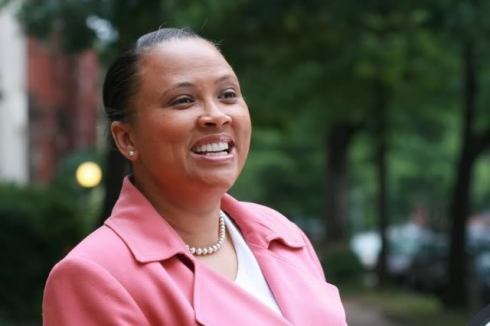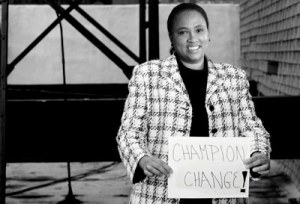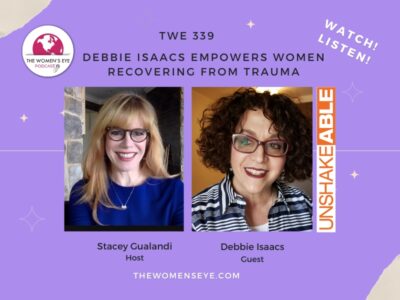
By Pamela Burke/Sept. 8, 2010
Cheryl Dorsey, President of Echoing Green, believes social entrepreneurship is the wave of the future and that it will create lasting social change. Her organization has invested over $28 million in seed grants to over 471 social entrepreneurs. Echoing Green says these funds have sparked social change in forty countries on five continents.
She describes the leaders of this new entrepreneurial movement as “so passionate, so idealistic, who believe so deeply in transforming the world in a positive way, that it’s infectious.”
This graduate of the John F. Kennedy School of Government and Harvard Medical School gave up dreams of being a doctor in 1992 and launched Echoing Green’s Family Van, a mobile unit providing outreach health services to patients from inner-city Boston. Ten years later, she became President of the nonprofit organization.
“My mother used to say when I was getting into trouble that life’s not fair and it’s up to you to figure out a way to change it. That was a powerful message.”
I was fortunate to hear Cheryl’s dynamic speech on Leadership at the Chautauqua Institute this summer. I wanted to ask her where she got her incredible drive to change the world and what words of advice she might have for women who want to become innovators. Recently I had the pleasure of speaking to Cheryl…
THE WOMEN’S EYE: You’ve worked to improve people’s lives in many different types of jobs. When did you know you wanted to make the world a better place?
CHERYL: I would trace it back to childhood growing up as an African-American kid in the late 60’s in Baltimore. I saw the world through a black and white prism. Equality issues were a constant backdrop to my parents conversation. My mother used to say when I was getting into trouble that life’s not fair and it’s up to you to figure out a way to change it.
That was a powerful message. Just because it happens a lot doesn’t mean you’re a victim. Figure out a way through it. It’s your responsibility to do it.
My parents were both public school teachers from the inner city and believed that education was the most important tool. They instilled that in their students and in me.
EYE: Do you have one particular mentor who inspired you?

CHERYL: My mentor is Dr. Nancy Oriol, Dean of Students at Harvard Medical School. She’s a transformative person, extraordinarily brilliant and passionate. I wouldn’t be who I am today without her influence. She said you’ve taught me as much as I’ve taught you. That’s a very powerful message. Mentoring doesn’t really capture it. The important thing is that both parties are learning.
I became part of her family. I sat at Nancy’s kitchen table where we developed the mobile health care unit.
EYE: Tell me about how that mobile van became a reality.

CHERYL: It was Nancy’s idea. She said poor women of color were coming in in dire circumstances after not receiving prenatal care. Boston’s best medical facilities were there but it didn’t matter if you couldn’t afford it and there was no transportation. She wanted to talk to me as a medical student. This was the culmination of conversations with my mother of “It’s not fair!”
What do you do when you’re outraged? This was my moment. I couldn’t walk away. It was at that table that we developed the health care unit that Echoing Green funded.
“I am a cultural translator…I try to bring strange bedfellows together to make things better for family and community.”
EYE: You’ve accomplished so much. Was the road a difficult one?
 CHERYL: I did a commencement address for Walden University about failure and my journey. People think that I work for a cool organization now, but it’s been a 25 year struggle. Our ultimate struggle is our identity. As a kid I was good in math and science and was encouraged to go to med school. But that was not my passion.
CHERYL: I did a commencement address for Walden University about failure and my journey. People think that I work for a cool organization now, but it’s been a 25 year struggle. Our ultimate struggle is our identity. As a kid I was good in math and science and was encouraged to go to med school. But that was not my passion.
I was a good daughter and the first in my family to go to an Ivy League school. All expectations were heaped upon me. It wasn’t until I lost my parents and other people that I began to understand the direction I wanted to go in.
A common theme in my family is that I’m the daughter of a French teacher and a Spanish teacher. I am a cultural translator. I’ve always walked between two worlds–the inner city and the hallowed halls of Harvard; my black and white friends; Wall Street and the social entrepreneurs I give money to. I try to bring strange bedfellows together to make things better for family and community
I think I’m still working on it. I feel pretty comfortable in my own skin. I have nothing else to prove. I’m doing what I’m supposed to be doing. I have more to learn but whatever the next challenge is, I’m open to it.
EYE: You gave up your dream to be a pediatrician to become a leader in the social entrepreneurship revolution. What made you change direction?
CHERYL: I always knew that I didn’t have the passion for medicine. I knew I wasn’t one of those people who thrived on taking care of patients. I asked myself when would I have the courage to pull the trigger.
My 91-year-old aunt calls me “the village idiot.” She says “Why aren’t you a doctor?” She loves me and we agree to disagree. I think I’m doing great stuff with what I decided to do.
“Women have qualities that are important for social change. They work together well; they have the ability to see that it’s not us vs. them. It’s we!”
EYE: Why is social entrepreneurship so important, especially for women?
CHERYL: It’s because the work they do is ultimately about expanding opportunities and social change. This is an important trend.
Women have qualities that are important for social change. They work together well; they have the ability to see that it’s not us vs. them. It’s we! They empathize and have the emotional intelligence to build relationships that are meaningful. Some of the most well known entrepreneurs are men, but that’s more a factor of them being able to get the resources. As women break into those circles, that will equalize.
EYE: What are the challenges you face helping women internationally who want to become social entrepreneurs?
CHERYL: We get a bad rap that it’s still a fairly exclusive elitist endeavor. It’s only the first wave. We’ve got to move beyond it. There are business leaders everywhere. Our challenge is how to get them into the pipeline to find them and fund them. We have no capacity to fund anyone who doesn’t speak English. It would be wonderful to give an Afghani woman access to this kind of capital. Penetrating these communities is a challenge.
EYE: Can you give an example of a woman with a great idea who’s been helped by funding from Echoing Green?

CHERYL: Anna Elliot is a 2010 Fellow who was just selected by us. She’s the founder of Bamyan Media and was a contractor for USAID working in Afghanistan. She understands the power of the media to reach a lot of people. She pitched an idea of an American Idol-like competition for people who wanted to start businesses in Afghanistan.
She produced a pilot program “Dream & Achieve” which was the most highly watched television program in the country two years ago. Seven million viewers realized that she hit upon an extraordinary social medium as a model. Now she’s trying to replicate it in other developing countries with our help.
“Social entrepreneurs bleed for their issue. They own it. They’re responsible and committed.”
EYE: A lot of ideas can be pie in the sky and have a downside. How can women learn to be risk tolerant?
CHERYL: That’s tough. I think part of it is genetic makeup. It’s hard to find the secret self that makes you you. Some of it can be taught. You start by raising people up who take chances. Social entrepreneurs bleed for their issue. They own it. They’re responsible and committed.
EYE: There’s always the possibility of failure. Have you ever failed and what did you learn from it?
CHERYL: I got fired when I worked for a for-profit business. I was not invested in the idea and was miserable on the job. That was an important lesson. When you commit, you’ve got to do it one hundred per cent.
Everyone is afraid to talk about failure. It’s equated with shame. Status quo people use fear of failure to tamp down on risk-taking. We become so afraid that we never reach our goals. The best thing that ever happened to me was being fired. The world did not end. I had always gotten the A’s. But the sun came up the next morning and I got another job. It was at Echoing Green!
EYE: How can women go “off-road” as you suggest and be innovators? You say, “Find your own North Star.”
CHERYL: It’s a tough time to go off-road. When you’re paying the mortgage, it’s difficult. It’s easier to go off-road when you’re young. A real window of opportunity is when you’re just starting out or after child rearing.
We’ve got to expand the definition of what success looks like. These social entrepreneurs think about how they want to walk through the world.
EYE: You said that personal power can come from a spiritual place, that it’s about confronting the demons that prevent us from living up to our full potential.
CHERYL: It’s a head-heart connection. We often don’t look at it that way. There needs to be an integrated whole.
I often think your gut is more intuitive than data. Many times we say there’s nothing to an idea and dismiss it. But something bubbles up from that place…your heart and soul are telling you something. Do you choose to listen? Many of us don’t.
“Echoing Green is a perfect example of the power of the network. It’s not about any one person.”
EYE: What’s next for you and Echoing Green?
CHERYL: I do believe that social entrepreneurship is at a really interesting place. It’s becoming a movement from being a field. It’s captured the imagination of millions of people all over the world from universities to the White House.
There is a perfect storm of passion and enthusiasm toward it. We’re trying to figure out how to be a leader in this movement.
I’m very positive. Echoing Green is a perfect example of the power of the network. It’s not about any one person. Our organization is off doing a ton of different things collectively. The strength of our numbers is extraordinary. I’m very confident about what is to come.
EYE: Thanks, Cheryl! Your message is truly inspirational.
QUESTION: Would you want to become a social entrepreneur?







Leave a Reply